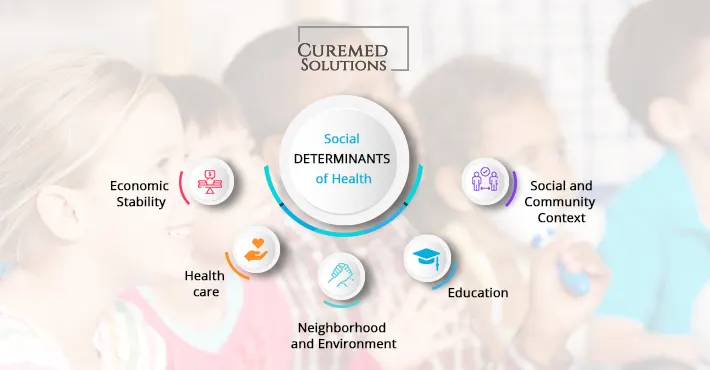


30 Mar 2022 Social Health
SDOH are the conditions in the environment where people are born, live, learn, work, play, and age. SDOH-related Z codes ranging from Z55-Z65 are the ICD-10-CM encounter reason codes used to document SDOH data (e.g., housing, food insecurity, transportation, etc.).
A 2017 survey of hospitals found that while 88 percent of hospitals do screen patients for SDOH, only 62 percent reported systematic or consistent screening of their patient population. Larger healthcare organizations and providers that treat disadvantaged patient populations reported higher screening rates for SDOH. Additionally, standardized terminology is not always used when documenting SDOH.
Social determinants of health codes are located primarily in these Z code categories:
» Z55 Problems related to education and literacy
» Z56 Problems related to employment and unemployment
» Z57 Occupational exposure to risk factors
» Z58 Problems related to the physical environment
» Z59 Problems related to housing and economic circumstances
» Z60 Problems related to the social environment
» Z62 Problems related to upbringing
» Z63 Other problems related to a primary support group, including family circumstances
» Z64 Problems related to certain psychosocial circumstances
» Z65 Problems related to other psychosocial circumstances
This section was updated in the ICD-10 guidelines for CY 2022 to allow for use of these codes when the information is documented. Coding professionals may use documentation related to social information from social workers, community health workers, case managers, or nurses if the documentation is included in the official medical record. In addition, patient self-reporting may be used for code assignment if incorporated into the medical record by a clinician or provider and signed off by the
provider/clinician.
19 new codes have been added to ‘Factors Influencing Health Status and Contact with Health Services, particularly to the SDOH. Codes Z55.5 Less than High School Diploma; Z58.6 Inadequate drinking-water supply has been added. Also, codes have been expanded to further specify homelessness as unspecified, sheltered, and unsheltered (Z59.00, Z59.01, and Z59.02). Food insecurity is broken down into Z59.41 (food insecurity) and Z59.48 (other specified lack of adequate food). Housing instability codes include Z59.811 (housing instability, housed with risk of homelessness), Z59.812 (Housing instability, housed, homelessness in past 12 months), Z59.819 (Housing instability, housed unspecified), and Z59.89 (other problems related to housing and economic circumstances).
Additional codes have been added for personal history of suicidal behavior, non-suicidal self-harm, Chimeric Antigen Receptor T-cell therapy, other cellular therapy, and gene therapy.
SDOH has a huge impact on health and how healthcare services are accessed. SDOH is rapidly becoming a high priority for payers and government entities, who recognize its vital role in elevating patient care and improving healthcare outcomes. To prioritize the importance of documenting and coding patients' social needs, coders should be updated with the new coding guidelines and should be allowed sufficient time to integrate coding for social determinants into their processes.